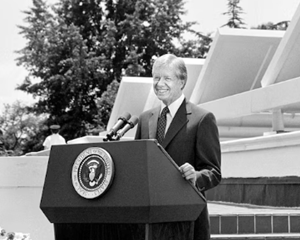2. He was a pioneer for green energy
2. 他是綠色能源的先驅
Alternative forms of energy would help define Carter's achievements -- and he would become the first president to install solar panels at the White House.
替代能源形式將有助于定義卡特的成就,他將成為第一位在白宮安裝太陽能電池板的總統。
After leaving the Navy to take over his late father's peanut farms in 1953, Carter became involved in local, then state and national Democratic politics.
1953年離開海軍接管已故父親的花生農場后,卡特開始參與地方、州和國家的民主政治。
After winning Georgia's 1971 gubernatorial election, he went on to win the 1976 presidential election.
在贏得1971年佐治亞州州長選舉后,他又贏得了1976年總統選舉。
Carter governed through a tumultuous time in his nation's history, leading a nation split by the Vietnam War and demoralized by the upheaval of social change.
卡特在他的國家歷史上經歷了一段動蕩的時期,他領導的國家因越南戰爭而分裂,并因社會變革的劇變而士氣低落。
He turned his sights toward tumult abroad. But at home, things were no less contentious, especially during the 1979 energy crisis that became a test—and hallmark—of his presidency.
他把目光轉向國外的騷亂。但在國內,事情同樣充滿爭議,尤其是在1979年能源危機期間,這場危機成為了他總統任期的考驗和標志。
The nation's population and economy had boomed in the wake of World War II. But so had its dependence on foreign oil.
第二次世界大戰后,該國的人口和經濟蓬勃發展。但對外國石油的依賴也隨之增加。
By the time Carter took office, energy had become prohibitively expensive, and the nation's energy consumption was more than twice that of other developed nations.
卡特上任時,能源已經變得昂貴得令人望而卻步,美國的能源消耗是其他發達國家的兩倍多。
In 1979, oil prices began to surge even higher. Carter had taken action earlier in his presidency to address the impending crisis
1979年,石油價格開始飆升。卡特在其總統任期早期就采取了行動來解決迫在眉睫的危機,
establishing the Department of Energy and proposing an energy plan that put forth nuclear energy and other forms of renewable energy as a possible solution with "very real and practical" benefits, despite the risk of increased weaponization.
即成立能源部并提出一項能源計劃,將核能和其他形式的可再生能源作為可能的解決方案,帶來“非常真實和實際”的好處,盡管武器化增加的風險。
But Carter believed that everyday people could help, too, and he embraced an ethos of personal energy conservation that became his signature.
但卡特相信,普通人也能提供幫助,他信奉的個人節能精神也成為了他的標志。

In a 1979 address, Carter called on ordinary Americans to conserve energy in their own homes, changing their personal habits for the good of all.
在1979年的一次演講中,卡特呼吁普通美國人在自己的家中節約能源,改變個人習慣,造福所有人。
"On the battlefield of energy we can win for our nation a new confidence, and we can seize control again of our common destiny," he said.
他說:“在能源戰場上,我們可以為國家贏得新的信心,我們可以重新掌握我們共同的命運。”
For Carter himself, that resulted in changes not just in policy, but at the White House, where he turned down the thermostat, wore a beige sweater in the Oval Office to stave off the cold, and installed the building's first solar panels.
對于卡特本人來說,這不僅導致了政策的變化,也導致了白宮的變化,他關掉了恒溫器,在橢圓形辦公室穿了一件米色毛衣來御寒,并安裝了大樓的第一塊太陽能電池板。
But the solar panels only heated the house's water for seven years. Carter was ultimately unable to rally the public around his austere energy policies.
但太陽能電池板只加熱了房子的水七年。卡特最終無法讓公眾支持他緊縮的能源政策。
In 1986, in a gesture reflective of the unpopularity of those policies, Republican President Ronald Reagan had the solar panels removed. (President Barack Obama would later reinstall solar in 2010.)
1986年,共和黨總統羅納德·里根下令拆除太陽能電池板,反映出這些政策不受歡迎。(巴拉克·奧巴馬總統隨后于2010年重新安裝了太陽能。)
Today, however, Carter's views on energy generation and conservation, along with his sweeping conservation policies, are largely seen as ahead of their time.
然而今天,卡特對能源生產和節約的看法,以及他全面的節約政策,在很大程度上被認為是超前的。












